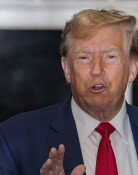Experts Discuss Pushing Forward FTA with U.S.
Experts Discuss Pushing Forward FTA with U.S.
Posted March. 31, 2008 03:03,
The Dong-A Ilbo recently interviewed three experts on the free trade agreement between Korea and the United States. Here are the highlights of what they said.
▽ Karan Bhatia, former deputy U.S. Trade Representative: The conclusion of the free trade agreement between Korea and the United States last year was significant progress for both countries. Unfortunately, the agreement has yet to be ratified by the parliament of either country. There are many issues obstructing ratification, but the biggest of all for the United States is import restrictions on U.S. beef by Korea.
▽ Thomas Hubbard, former U.S. ambassador to Seoul: I agree that the first step for the two countries to take toward ratification of the agreement is resolution of the beef issue. Only when this issue is addressed can we could put cars or other areas on the table and see the reactions of the legislatures.
▽ Kim Seok-han, lawyer: The beef issue is essentially not an agenda for the agreement, but now the situation calls for a resolution to move forward. Former Korean President Roh Moo-hyun wanted to settle the affair before leaving office, but to no avail.
▽ Lee Gi-hong, Dong-A Ilbo Washington correspondent: Do you believe the resolution of the beef issue will be enough for the deal to pass through Congress? Last year, Charles Rangel, chairman of the House Ways and Means Committee which approves all free trade deals, pledged against approving the Korea-U.S. agreement without a renegotiation on the car sector in an interview with The Dong-A Ilbo.
▽ Bhatia: The substantial benefits the agreement will bring to the United States are not widely understood yet. They are not real or tangible. If the beef issue is resolved, which will signal that Korea is opening up its market on par with international standards, it will change U.S. congressional sentiment toward the deal more favorably.
▽ Kim: I disagree. This is a presidential election year in the United States and the Democratic Party has yet to decide its candidate. Trade will remain a thorny and emotional issue. Against this backdrop, Congress is unlikely to ratify the agreement even with the resolution of the beef issue. It is more likely that some congressmen will keep raising issues with certain areas of U.S. interest, including cars as well as beef.
▽ Lee: Korea has agreed to certain demands for renegotiation. Seoul has firmly ruled out a renegotiation on the automotive sector.
▽ Kim: Unfortunately, the fundamental issue is not Korea or trade. U.S. domestic politics is the source of the deadlock. The deal is a good agreement that makes a lot of sense for both countries. Its ratification, however, depends on U.S. political issues. The two countries need to do something to address U.S. concerns over the automotive sector. This is all because of the political conditions in the United States.
▽ Hubbard: Settlement of the beef issue will make a dramatic change in the ambience and create an opportunity for ratification, but the auto sector will remain a serious political issue. I am all for the U.S. Trade Representatives position of no more revision. Still, some concerns of the U.S. auto industry could require answers from joint efforts of the two countries aside from revision of the deal.
▽ Lee: Lets assume that the beef issue is resolved. Then do we have enough time to ratify the deal by the end of this year? What strategies the Korean government should adopt?
▽ Bhatia: If Korea wants the deal passed by Congress in the near future, say before this fall, there is not much time left to conduct a campaign to win bipartisan support. The deadline is not far away, if not today or tomorrow.
▽ Hubbard: I agree. There is a good chance that the deal will stall throughout this year, but I am sure whomever the next [U.S.] president might be, the agreement will be eventually ratified. There is no fixed deadline in that sense. But this year is the right time. If the deal is presented before the end of May, there will be enough time.
▽ Kim: We can make ratification happen if we have the will, as far as time is concerned. But the political situation, as well as the beef and automobile issues, will make it difficult. The U.S. economy is worsening, and free trade is becoming less and less popular. The Democratic Party is expected to gain more seats in both the Senate and the House. Its leading presidential candidates, Barack Obama and Hillary Clinton, both oppose the deal. Rice will be the next source of controversy after beef and automobiles. Obama has already raised the rice issue. It is best for Korea to close the issues as soon as possible. I dont think the situation will be any better in 2009.







